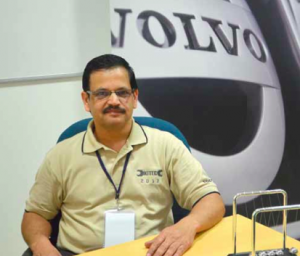 When Swedish giant Volvo entered India in 1998, its biggest challenge was the fact that high-end technology commercial vehicles were not common in the market. From the very beginning, the company realised the need for competent manpower and well-trained drivers which paved the way for a benchmarking training centre. Volvo has been successful in all the markets it has entered worldwide, thanks to certain concrete practices within the organisation. It is a known fact that to obtain an output a suitable input is required without which progress would be an uphill task. In an interview with MOTORINDIA, Mr. Anand Shouche, AGM – Competence Development, Volvo Trucks India, attributes the company’s extensive efforts in competence-building to Volvo’s global success.
When Swedish giant Volvo entered India in 1998, its biggest challenge was the fact that high-end technology commercial vehicles were not common in the market. From the very beginning, the company realised the need for competent manpower and well-trained drivers which paved the way for a benchmarking training centre. Volvo has been successful in all the markets it has entered worldwide, thanks to certain concrete practices within the organisation. It is a known fact that to obtain an output a suitable input is required without which progress would be an uphill task. In an interview with MOTORINDIA, Mr. Anand Shouche, AGM – Competence Development, Volvo Trucks India, attributes the company’s extensive efforts in competence-building to Volvo’s global success.
The Volvo driver training centre provides a comprehensive training package to drivers while it also instils a sense of pride in them when they take their seat in a Volvo vehicle. The company also focusses on technical training to ensure that all drivers and technicians are abreast with the latest technological developments in the market. The Competence Development Center (CDC) offers an internal training and an external training. The former is dedicated to Volvo employees, who service and maintain the vehicles within the company’s network while the latter is directed towards drivers, mechanics and fleet managers from various customer organisations.
On-the-job trainers
In order to have efficient competence development, apart from classroom inputs, Volvo also has a dedicated network of on-the-job trainers who work as an extended arm of the CDC. While the CDC offers specialised training to people, the on-the-job trainers meet the local requirements at different places across India. Since on-the-job trainers’ focus is on a specific local market, they speak the native language and are in a better position to service to local requirements in the region. Currently, the trainers are present in 23 centres across India, of which 13 are owned by Volvo while 10 belong to private dealers. The company is also in the process of deputing one regional competence development manager to supervise a particular region.
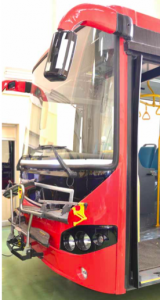 Volvo seems to have hit the bull’s eye when it comes to the basics of training. The company believes that providing the same inputs to all kinds of people is not the way forward. “We don’t give them (the trainees) what we want to give; we want to give them what they want. We customise the training based on the market requirements and as every market is different, everyone will not fit into the same kind of training delivery. We create a lot of flexibility within the system so that we meet the precise requirements. We don’t release our training calendar for the year. Instead we have an online portal where we provide details of the training courses. People who are interested in taking up the training block the dates convenient for them and depending on the number of nominations the training is conducted”, said Mr. Shouche.
Volvo seems to have hit the bull’s eye when it comes to the basics of training. The company believes that providing the same inputs to all kinds of people is not the way forward. “We don’t give them (the trainees) what we want to give; we want to give them what they want. We customise the training based on the market requirements and as every market is different, everyone will not fit into the same kind of training delivery. We create a lot of flexibility within the system so that we meet the precise requirements. We don’t release our training calendar for the year. Instead we have an online portal where we provide details of the training courses. People who are interested in taking up the training block the dates convenient for them and depending on the number of nominations the training is conducted”, said Mr. Shouche.
Overall driver development
When it comes to driver training in Volvo, it can more aptly be called ‘driver development’ since it focusses on overall development of the driver. The training, with 20 per cent of theory and 80 per cent of practical exposure, is for five days at the end of which the driver comes out not just enriched with theoretical and practical aspects of driving but a lot more. First, the driver undergoes a medical examination to check his height, weight, blood pressure and color blindness.
It is a startling fact that seven to eight per cent of the drivers who come for the training are color blind, something which the drivers themselves are unaware of. After extensive training, on the fifth day, the trainees undergo a theoretical and a practical test after which he is declared fit for driving and is presented a certificate of completion. Those drivers who fail to make the cut could apply for re-training after a month.
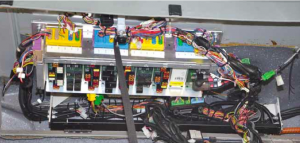 Apart from the physical driver training there are sessions to inculcate responsibility and right attitude, road science, social values and family values. Sensitive but practically important issues such as drug addiction and AIDS awareness are also touched upon, providing the drivers a complete understanding of the challenges that lie ahead of them, yet, those which could be tackled with the right training. Volvo believes that each driver who comes out of the training will drive safely and with pride, something which makes a world of difference on Indian roads, if not on global roads too. The company has seen very good results from the training regime with many people from the industry lauding its committed efforts towards improving the standard of drivers in the country.
Apart from the physical driver training there are sessions to inculcate responsibility and right attitude, road science, social values and family values. Sensitive but practically important issues such as drug addiction and AIDS awareness are also touched upon, providing the drivers a complete understanding of the challenges that lie ahead of them, yet, those which could be tackled with the right training. Volvo believes that each driver who comes out of the training will drive safely and with pride, something which makes a world of difference on Indian roads, if not on global roads too. The company has seen very good results from the training regime with many people from the industry lauding its committed efforts towards improving the standard of drivers in the country.
Technology for quality
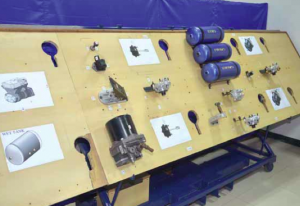 Volvo uses latest technology to aid trainees and has installed an equipment called P-Drive (Personalized Drive), which has four video cameras, on its trucks. The P-Drive records the entire driver test with which the company could objectively assess the driving skills and inform the driver about areas which need improvement. The training is separate for buses and trucks with some sessions which are common to both. Volvo has four trainers who are specialised in different aspects of training and the batches for training are split into four. The trainees are either sponsored by the dealerships they come from or come on their own interest. The company aspires to create a pool of drivers who are professionally trained to deliver high quality on the challenging roads of India. Mr. Hari Babu is the overall in-charge of external training at the centre.
Volvo uses latest technology to aid trainees and has installed an equipment called P-Drive (Personalized Drive), which has four video cameras, on its trucks. The P-Drive records the entire driver test with which the company could objectively assess the driving skills and inform the driver about areas which need improvement. The training is separate for buses and trucks with some sessions which are common to both. Volvo has four trainers who are specialised in different aspects of training and the batches for training are split into four. The trainees are either sponsored by the dealerships they come from or come on their own interest. The company aspires to create a pool of drivers who are professionally trained to deliver high quality on the challenging roads of India. Mr. Hari Babu is the overall in-charge of external training at the centre.
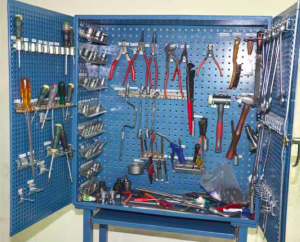 VISTA (Volvo International Service Training Award), started in 1957, is a customer service training competition which has now run bi-annually for over 30 years. Today it is the biggest competition for aftermarket personnel in the world. VISTA being an international event has rounds which are related to advanced global models giving an edge for European participants over Indian competitors who are not as competent. The Volvo Fuel Watch is another event aimed at improving competence of drivers worldwide.
VISTA (Volvo International Service Training Award), started in 1957, is a customer service training competition which has now run bi-annually for over 30 years. Today it is the biggest competition for aftermarket personnel in the world. VISTA being an international event has rounds which are related to advanced global models giving an edge for European participants over Indian competitors who are not as competent. The Volvo Fuel Watch is another event aimed at improving competence of drivers worldwide.
KITEC
In order to bridge the technology gap between Indian and abroad, Volvo India initiated the Key Indian Technical Excellence Competition (KITEC) competition in 2008. Ever since, KITEC has evolved as a powerful tool and a proven platform for competence development of Volvo’s network workforce, the key people, who take care of the company’s esteemed customers’ requirements. KITEC is the biggest competition and a unique initiative at Volvo Trucks India.
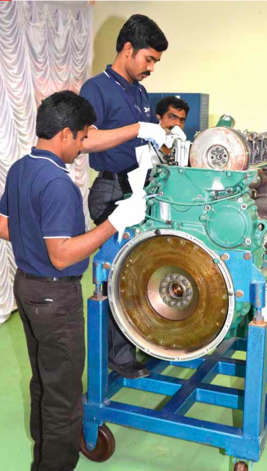 In 2010, the official KITEC logo was designed and registered. The competition’s third edition in 2012 corresponded to more than 11,000 training hours across its network and continues to remain a perfect platform to encourage teamwork and building relations throughout the network.
In 2010, the official KITEC logo was designed and registered. The competition’s third edition in 2012 corresponded to more than 11,000 training hours across its network and continues to remain a perfect platform to encourage teamwork and building relations throughout the network.
The final session of KITEC is a half-day conference where Volvo personnel share knowledge with the participants. The competition winners share their experience at the event and the interactive session makes participants learn more and build competence which is the ultimate goal of the event.
The Volvo way
Some aspects of the Volvo training which make it stand out:
• Flexible courses and a unique training material: on-the-job trainers can modify course delivery and prepare their own presentations according to the market requirements.
• Focus on practical aspects: trainees are made to work on the actual vehicle which gives them hands-on experience and boosts confident.
• Well-structured: trainees are graduated in levels and the training is well-spaced to enable them get inputs, absorb it and make it practically useable.
• Specialised expertise: training is focussed on providing specialised expertise to trainees in specific areas. More training is rendered in areas with higher demand in the market